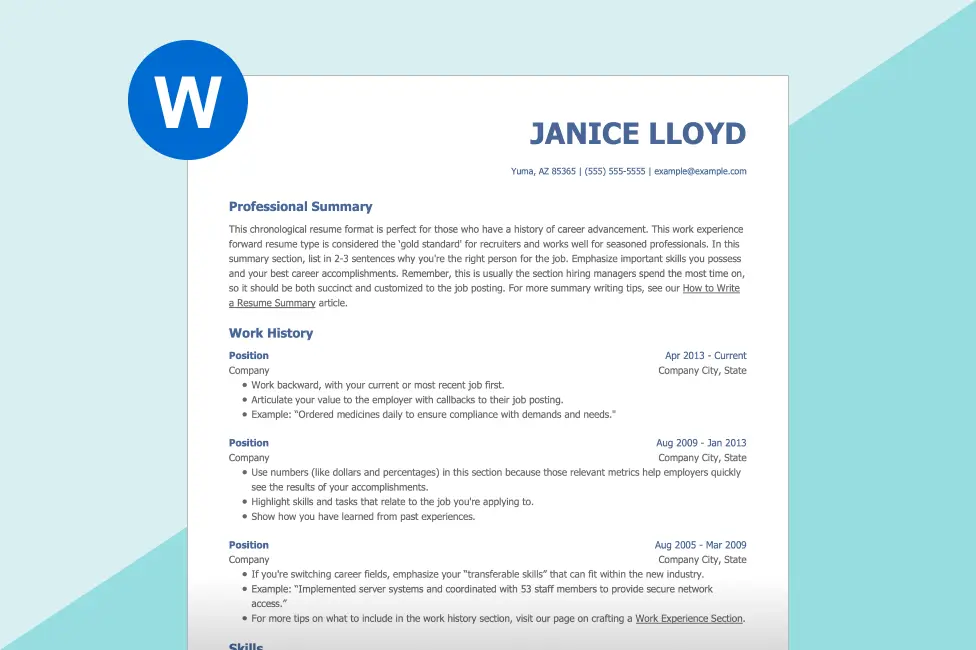How to Include Projects on Resumes Examples
Beyond listing experiences and qualifications, integrating projects in your resume is key to improving your resume in tangible ways, setting you apart from other candidates.
If you want a resume that showcases relevant projects, in-demand skills, measurable achievements and impeccable grammar, try our professional Resume Builder and get a personalized resume in minutes!
Why include projects on your resume?
Projects on a resume refer to specific initiatives or tasks you have worked on, either independently or as part of a team, that showcase your skills, experience and achievements.
Rather than simply listing qualifications, projects offer tangible evidence of your abilities, providing potential employers with real-world examples of your competency.
Experience is still the number one factor recruiters look for in a resume. Showcasing how you’ve practically applied your skills sets you apart from other candidates and demonstrates your proactivity and ability to deliver results.
Types of projects to put on a resume
Academic projects
Highlighting academic projects on a resume helps you showcase relevant skills and knowledge gained through your educational experiences. These projects are tangible examples of your ability to apply theoretical concepts to practical situations, which is especially beneficial when writing a resume when you have no experience.
Personal projects
Incorporating personal projects into your resume demonstrates your passion, creativity and initiative beyond formal education or employment. These projects provide insights into your interests and hobbies, demonstrating your ability to take initiative and pursue meaningful endeavors outside traditional settings. Whether developing a mobile app, creating a personal blog or participating in community initiatives, personal projects on a resume showcase your diverse skills and dedication across various industries.
Professional projects
Detailing professional projects, including freelance work or internships, adds value to your resume by showing off your experience and achievements in real-world settings. These projects demonstrate your ability to deliver results within professional contexts and highlight your adaptability, collaboration skills and capacity to meet client or employer needs. Some examples of professional projects can be successful freelance contracts, completed intern projects or impactful volunteer work.
When should you list projects on a resume?
When you’re changing careers
Career changers transitioning to a new industry or role can leverage projects to showcase transferable skills and relevant experiences. By including projects that highlight their transferable skills, such as leadership, problem-solving, or project management, career changers can bridge the gap between their previous experience and their desired role. Additionally, participating in industry-specific projects or initiatives during transition helps you establish credibility and demonstrate your commitment to the new field.
When you’re a student or recent graduate
Students and recent graduates often lack extensive professional experience but possess relevant academic knowledge and skills. Including academic projects on your resume allows you to showcase how you apply theoretical concepts in real-life scenarios, demonstrating to employers you’re prepared to take on a formal job.
When you’re a freelancer or entrepreneur
If you’re a freelancers or entrepreneur, you benefit from listing projects on your resume since they help you demonstrate your expertise and keep a record of successful projects. Including notable client projects or entrepreneurial ventures showcases your ability to deliver results independently and adds credibility to your professional profile.
When you have a career gap
Job seekers with career gaps or breaks can use projects to bridge that hiatus and reassure potential employers their skills have remained relevant. Participating in volunteer projects, personal initiatives or skill-building projects during your gap period demonstrates your dedication to continued learning and engaging within the industry.
How to showcase projects on a resume
You can include projects on a resume in a myriad of ways. You can highlight relevant projects in key sections of your resume, such as the work experience or the professional summary. You can also focus on multiple projects in a separate resume section.
Adding a “Projects” section on your resume
If the bulk of your experience comes from various personal or freelance projects, you will benefit from adding an extra section for projects in your resume.
You should format this section similarly to the “Work Experience.”
- Provide a name for the project, i.e., “Creative Campaign & Copywriting Services.”
- Share the name of the client or organization you collaborated with.
- Dates of the project’s duration.
- Bullet points describing the project scope, execution and measurable results.
Here’s an example:
Projects
Marketing Campaign Launch
Client: Luxor Cosmetics
Atlanta, GA
Duration: June 2020 – August 2020
- Developed and executed a comprehensive marketing campaign to promote Luxor Cosmetics new product launch.
- Implemented targeted advertising strategies on digital platforms, resulting in a 30% increase in online sales during the campaign.
- Received positive feedback from stakeholders and achieved a 40% ROI on marketing spend.
Incorporating projects into the work experience
Another way to showcase relevant projects is in your resume’s work experience section. In this case, you will write your resume work experience as you usually would but reference a relevant project and its measurable achievements in your bullet point descriptions.
Check out how this candidate highlights professional projects in their work experience section:
Work Experience
Project Architect
Isis Architecture Firm
Chicago, IL
January 2018 – Present
- Led the design and development of the Pilot34 Office Complex, a LEED-certified project, achieving a 20% reduction in energy consumption and a 30% decrease in water usage compared to conventional buildings.
- Managed a team of architects and engineers in renovating the historic John G. Ford Building, preserving its architectural integrity while incorporating modern amenities, resulting in a 15% increase in property value and recognition with the Heritage Preservation Award.
- Collaborated with urban planners and landscape architects on the development of the STU Mixed-Use Development, integrating sustainable design principles and green spaces, resulting in a 25% increase in foot traffic and positive community feedback.
Listing projects in your education section
Including projects in the education section of your resume can also be highly effective. In this approach, you’ll still list your educational background as usual but incorporate relevant projects and their measurable achievements within the education section itself.
Here’s an example of how you can structure this:
Education
Bachelor of Science in Civil Engineering
Northwestern University, Chicago, IL
Capstone Project: Sustainable Urban Development
- Led a multidisciplinary team in designing and implementing sustainable solutions for urban infrastructure.
- Achieved a 30% reduction in carbon emissions through innovative transportation and energy systems.
- Presented project findings at the National Sustainable Development Conference, garnering recognition for innovative approaches to urban planning.
Mentioning projects in the resume summary
Incorporating projects into the resume summary can provide a powerful introduction to your qualifications and accomplishments. Give employers a peek into your experience and skills by including one relevant project and its results in your resume summary.
Here’s an example of how you can do this:
Professional Summary
Dynamic Project Manager with a proven track record of delivering successful outcomes in diverse industries. Skilled in leading cross-functional teams and executing projects from inception to completion. Managed the execution of the DEF Product Launch Initiative, delivering the project ahead of schedule and under budget, resulting in a 15% increase in market share within six months.
You can find tailored, quality content just like the ones in these examples when you use our Builder to write your resume. Simply type in your desired role and let our Resume Builder generate a personalized resume you can customize with additional sections for Projects and more with the click of a button.
Tips for selecting projects to include in your resume
- Choose projects that align with the target job or industry: Select projects directly related to the skills, responsibilities and requirements of the job you’re applying for. For example, if you’re applying for a software engineering position, highlight projects where you developed software applications or coding projects relevant to the job’s technical requirements.
- Tailor project descriptions to match job requirements: Customize your project descriptions to emphasize the skills and experiences most relevant to the job you’re targeting. A good tip if you’re unsure about how to update your resume for a new job application is to use keywords from the job description to ensure the projects you list align with the employer’s needs.
- Emphasize the outcomes and impact of each project: Instead of just listing project tasks or activities, emphasize the results and achievements you delivered. Describe the specific outcomes or goals you accomplished through each project, such as increased efficiency, cost savings, revenue growth or customer satisfaction.
- Include quantifiable results to demonstrate achievements: Share your project’s quantifiable achievements using measurable metrics or data. For example, quantify the percentage increase in sales, the reduction in processing time, the cost savings achieved, or the number of customers reached.
- Showcase projects that illustrate your ability to solve real-world problems: Choose projects that demonstrate your ability to solve complex issues, overcome challenges, and make a meaningful impact. Highlight projects where you successfully addressed business needs, improved processes, or implemented innovative solutions. This showcases your problem-solving skills, initiative, and ability to drive positive change.
Resume examples that showcase projects
Check out how we incorporate projects on our resume examples by finding your desired job title or career scenario in the resume samples below.
Student
Project manager
Software engineer
Accountant
Sales manager
Key takeaways
- Incorporating projects into your resume can set you apart from other candidates by showcasing your skills and experience.
- Highlighting academic, personal and professional projects demonstrates your diverse skills, creativity and initiative to potential employers.
- Carefully selecting your resume projects and tailoring their descriptions for each job application is crucial to solidifying your candidacy and demonstrating your relevance to the role.
- You can showcase projects in various sections of your resume, including a dedicated “Projects” section, the work experience section, the education section or the resume summary.
- When selecting projects for your resume, prioritize relevance, detail, quantifiable results, and your ability to demonstrate your problem-solving skills and deliver tangible outcomes.









